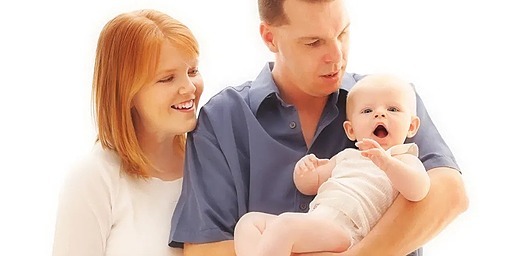A recent Health Canada study found that while the average length of hospital stays for new mothers dropped from 4.2 days to 2.7 days between 1989/90 and 1996/97, the hospital readmission rate for newborns jumped from 27.3 per 1,000 to 38.0 per 1,000 over the same period. The most common reasons for readmission were dehydration and jaundice – problems that might have been detected and treated sooner if the babies were being monitored by experienced health-care professionals.
Your new baby has finally arrived, and it’s time to bring your little one home. As you look down at this innocent little face, you may well feel overwhelmed by the new responsibilities that come along with this little bundle of joy. Feeding, bathing, diapering, and dressing an infant are all skills that need to be mastered. While this, no doubt, is one of the most joyful moments of your life, it might also be one of the most anxious.
Leaving the hospital
In recent years, many new babies and moms leave the hospital within 48 hours of birth. There are many reasons for this trend, including requests for new moms to be at home with their babies, and the need to cut hospital costs. With proper follow-up at home, early discharge is safe. It may also offer psychological benefits to families wanting to spend time bonding together.
Healthy, full-term babies can be discharged from hospital before they are 48 hours old, after a complete physical examination. These babies must have:
- Undergone screening tests to detect certain A normal temperature.
- Two successful normal feedings.
- Urinated and passed a bowel movement.
- Received all necessary medications, such as antibiotics (to prevent eye infection) and vitamin K.
- Received any necessary immunizations such as hepatitis B.
- Undergone screening tests to detect certain problems, such as hypothyroidism and PKU (a disease where the body cannot use phenylalanine, a naturally occurring amino acid essential for a baby’s optimal growth). If tests have not been done, arrangements should be made for these to occur after discharge.
Mothers are also checked to ensure that they are physically well, able to recognize illness in the baby, comfortable caring for the baby, and have mastered the basics of breast-feeding.
Within 48 hours of going home, babies should be assessed for weight, jaundice, feeding, and general health. Any required screening tests should be completed. The doctor or health care professional will also ask new parents questions about how the family is getting along.
Even before delivery, plans should be made for the baby’s future health care. Parents should know how to access community services for routine baby care, breast-feeding support, and emergencies.
If a baby needs to be readmitted to the hospital in the first week of life, the mother should have a room with or near the baby. This way, she can continue breast-feeding, and both mom and baby can continue to bond.
Bringing baby home
To help you feel somewhat more comfortable in those first few days after bringing baby home, here are some tips for taking care of your infant:
Be sure to always hold baby’s head and neck – newborns can’t hold their heads for at least a month after birth.
- Very young babies feel afraid of falling or being dropped. To help them feel secure, hold them close to your body.
- Give your baby a chance to get used to your touch before you move and lift him.
- Bathing is a good time for you to be close to baby. You don’t have to give her a full bath every day, but you should clean the diaper area daily with a washcloth.
- Never leave baby alone in the bath or on a table. It takes just a second for baby to fall into the water or off a table. When reaching for something, keep a hand on the baby. If you need something that’s on the other side of the room, take your baby with you.
- Make sure the water temperature is right before you put your baby in the bath. Never add warm or hot water when your baby is in the water.
- Changing your baby’s diaper is a perfect time for sharing tender moments. As your baby looks up at you, talk or sing to him.
- If you change your baby on a table, always keep one hand on the baby. It can take only a second for a baby to fall off a change table.
- Babies can get overheated or chilled more easily than an adult, as babies’ bodies can’t control body temperature as well as adults. Feel the back of baby’s neck to make sure he isn’t too cold or too warm.
- In winter, keep your baby’s hands and feet covered and protect their face from the wind. As a general rule, your baby should have one more layer of clothing than you.
Learn More
For more information the following resources may be helpful.
- Intimacy: The Art of Relationships. Psychology Today. https://www.psychologytoday.com/us/articles/196912/intimacy-the-art-relationships
- Parenting Resources and Support. Government of Canada. https://www.canada.ca/en/public-health/services/health-promotion/childhood-adolescence/parent/parenting-resources-support.html
- Healthy Families BC. https://www.healthyfamiliesbc.ca/parenting
- Growing Healthy Canadians: A Guide For Positive Development.
- What do I need to know about getting a divorce? https://www2.gov.bc.ca/gov/content/life-events/divorce/family-justice/family-law/separation-divorce/what-do-i-need-to-know-about-getting-a-divorce
- Families Change: A Guide to Separation and Divorce. https://www.familieschange.ca/
- Relationships – Tips For Success. https://www.betterhealth.vic.gov.au/health/healthyliving/Relationships-tips-for-success
Note:
The contents on Avail such as text, graphics, images, and information is not intended to be a substitute for professional medical advice, diagnosis, or treatment. Always seek the advice of your
physician or other qualified health provider with any questions you may have regarding a medical condition. Never disregard professional medical advice or delay in seeking it because of something you have read on this or any other website. Source: Adapted from information provided by the National Health Service (UK) open licence.













